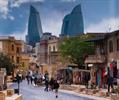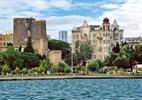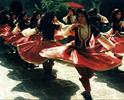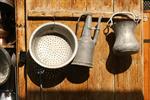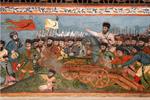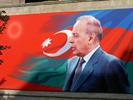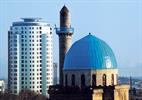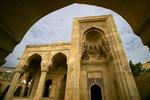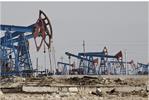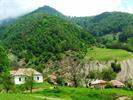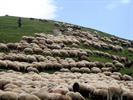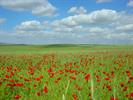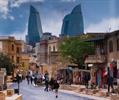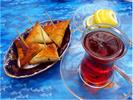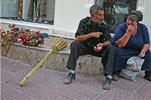We would like to thank you for this great trip. The organisation was perfect and our guide excellent and very helpful. He spoke French fluently which was very pleasant for us. Thanks again. Best regards. Christian and Martine
 Price: $590.00
Price: $590.00 Duration: 6
Duration: 6 from January to December
from January to DecemberDay 1
Meeting at Azeri-Georgian border point near Lagodekhi (Georgian side) / Balakan (Azeri side) at around 13:00 and transfer to Sheki. Accommodation in Issam Hotel (accommodation at Caravan Saray Hotel can be arranged at special request if needed).
Lunch.
After short rest start your tour in Sheki. Sheki is one of the most famous and ancient places of Azerbaijan. Situated 700m above sea level like an amphitheatre surrounded by mountains and forests of oak trees this ancient city was long famed as a silk centre and an important stop on the Great Silk Route. Sheki is long famed as a silk centre and an important stop on the Silk Road. Sheki still has the site of a huge factory that was once the Soviet Union's largest silk plant (such a big factory was naturally named after Lenin...). Unfortunately this factory is closed now.
The tour will be started from visiting 18th century Khan's summer palace with magnificent frescos (one 24 m long) and exquisite stained glass work (northern part of the city). Sheki History museum with artifacts from several periods, but notorious for pieces relating to silk manufacturing and trade.
On this day you will visit also sweet shops of Sheki, a lot of souvenir shops and workshops where make exquisite stained glass work named Shabaka and workshop of national musical instruments.
Also you will visit the Albanian church located in nearby Kish village. Legend say that church was built in 78 AD, but the researchers place it a few centuries later.
Upon your return to the hotel and having a local style dinner you will have a free time with an opportunity to enjoy a scenic view of Caucasus mountains.
Day 2
After breakfast you will be guided to the local bazar in Sheki, to see the daily life of ordinary people, their shopping habits and have an opportunity to purchase some local souveniors. After you will be taken to Baku with several interesting stopovers on the way. The drivig time from Sheki to Baku is about 4-5 hours but we will spend all the day due to several stops for sightseeing. On the way several stops will be made to visit Nij village in Gabala region where you will have a chance to check 18th century Albanian church and the ruins of 18th century Armenian church. Another stop is at Lahij village - notable place in Azerbaijan, with its authentic handicrafts traditions, particularly related to copper. The village's carpet and rug crafts are also well known in Azerbaijan and the South Caucasus. Lahij has an old sewage system (some experts claim that it was built 1000 – 1500 years ago). Due to frequent earthquakes local people have developed sophisticated and authentic construction techniques. The next stop will be in Shemakha where you will visit two-storied Deri Baba mausoleum (15th century) and Seven Domes mausoleum.
The ancient town of Shemakha is located at the foothills of the Big Caucasus Mountains Chain. The general elevation of Shemakha is 800 meters over the sea level. One of the most ancient oriental trading cities, it claims to be the city of Kmakhia mentioned by the ancient Greek geographer Ptolomy in his book 'Geography'.
The architecture of Diri-Baba is in harmony with the picturesque environment - the landscape of rocks and green trees. The building of the mausoleum is a masterpiece of Shirvan architecture school, the beautiful creation of ancient craftsmen. The monument is under protection of the state. Seven Domes mausoleum it is ancient cemetery of members of Royal Shirvan Shakh dynasty located with a good view for all city.
Check-in to hotel in Baku. Dinner & rest.
Day 3
After the breakfast start the walking tour in Old Town - 'Icheri Sheher'. You will see the highlights of Icheri Sheher including the Palace of the Shirvans (the most striking example of the medieval palace structures in Azerbaijan, dating to the middle of 15th century); Maiden's Tower (the ancient, eight storey fortress originally built as a fire beacon); visit Dzhuma Mosque, antiques and carpet shops. Have lunch. Proceed with sightseeing tour across the city. Pay a visit to Martyr's Cemetery, located on the higher slopes of the city's west-end, this is the best place for panorama viewing of the city and the Bay of Baku.
The second half of the day will be spent primarily within the Greater Baku, where you will be taken to main sites on the Absheron Peninsula. You will visit Ateshgah - the Fire Worshippers' Temple located in the village of Surakhany. It was built on land where natural gas burned eternally by Zoroastrian believers who travelled from the province of Multan in India to worship. These ancient fires are believed to have given Azerbaijan its name, which is thought by some researchers to mean the 'Land of Fires'. You will also visit well preserved ancient castle in Mardakany settlement. Actually, there are several fine medieval castles scattered across Absheron Peninsula and dated XII-XIII AD - one at Amirajan and Nardaran areas and two at Mardakyany - apparently built for defense by the Shirvan shahs in the 13-14th century.
You will also visit very picturesque mosque in Shuvelan village named after Mir Movsum Aga and also Yanar Dagh place, where a small hillside is constantly and naturally aflame. This place looks especially fascinating at the dark. Our today's tour ends with a visit to Heydar Aliyev Center - a cultural center that includes the Auditorium (convention center), a museum, exhibition halls, administrative offices. The project center has been designed by renowned British architect Zaha Hadid.
Day 4
Breakfast and leaving Baku around 08:30 and arrival to Quba at around 11:00. Short sightseeing program in Quba and Krasnaya Sloboda.
Krasnaya Sloboda is Azerbaijan's mountain Jews settlement. Over the years, they've clung to the broad outlines of their religion. Perhaps 40,000 of them remain. Over the years, they borrowed customs from their amiable Muslim neighbors, but never assimilated. Even as their knowledge of the rituals seeped away, they adhered to the broad outlines of Judaism, faithfully attending Sabbath prayers, scrubbing their homes on Fridays, baking their own matzo on Passover and eschewing pork.
After trip to Krasnaya Sloboda and lunch a short 1 hour transfer to Xinalig settlement along the marvelous mountainous road. There are no restaurants in Xinalig so if needed meals can be arranged in the local house on a spot. Short hiking to surrounding mountains and in village itself. Return to Baku and arrival to hotel at around 20:00.
Day 5
On this day you will visit the Gobustan reserve. This is an open-air museum littered with Neolithic rock drawings. Just 65km south of Baku, Gobustan has some 4000 inscriptions that go back 12,000 years (with some 2000 year old Latin graffiti to boot). The well-preserved sketches display ancient populations travelling on reed boats; men hunt antelope and wild bulls, women dance. The famed Norwegian anthropologist Thor Heyerdahl returned many times to Azerbaijan between 1961 and his death in 2002 to study the site, which he argued to be evidence that modern-day Scandinavians migrated north through the Caucasus in prehistoric times. He found similarities in the drawings to those found in Scandinavia, particularly some in Alta, Norway. According to Icelandic Sagas, written in the 13 th century, the Norse God Odin (Wotan) migrated from the Caucasus in the first century AD.
After that you will also have a chance to visit quite a unique site where 300 of the planet's estimated 700 mud volcanoes sit Gobustan, Azerbaijan and the Caspian Sea. Many geologists as well as locals and international mud tourists trek to such places as the Firuz Crater Gobustan Salyan mud tourists trek to such places as the Firuz Crater, Gobustan, Salyan and end up happily covered in mud which is thought to have medicinal qualities. In 2001 one mud volcano 15 kilometers from Baku made world headlines when it suddenly started spewing flames 15 meters high.
Unfortunately, the mud volcanoes area has been recently declared a National Park with restricted access, though sporadic visits seems feasible as there is no security. Besides, hardly anyone would have a patience to literally guard tons of mud. But visit there definitely worth a visit as it's one of the rarest things one can find on Earth.
Have lunch. Proceed with sightseeing tour across the modern Baku city. Pay a visit to Bibi Heybat Mosque and Martyr's Cemetery, located on the higher slopes of the city's west-end, this is the best place for panorama viewing of the city and the Bay of Baku. After that you will have a walk along Baku Boulevard, the second longest one in the Europe. You can get a boat and make 30 minutes trip along Baku Bay. You will be introduced with the interesting facts and legends of the largest lake in the world better known as Caspian Sea. Return to the hotel.
Day 6
Transfer to airport.
| N of pax |
Tour cost for group (USD, $) |
Cost per pax (USD, $) | Special notes |
| 2 | 1800 | 900 | 4 seater sedan or 4WD vehicle to be provided |
| 4 | 2360 | 590 | 7 seater van to be provided |
| 6 | 3000 | 500 | 15 seater van to be provided to allow luggage |
| 8 | 3400 | 425 | 15/20 seater van to be provided to allow luggage |
| 10 | 3200 | 320 | 15/20 seater van to be provided to allow luggage |
Package includes:
- Accommodation in 3* Azscot hotel (double/twin occupancy for groups), Issam hotel in Sheki
- Breakfasts in the hotels (lunches and dinners in private house in Xinalig)
- Private vehicle accompanied by an experienced English speaking local guide who will look after you exclusively
- Local driver for your vehicle, exclusively for your tour
- Sightseeing program including all entrance fees
- Private guided transfers to and from airport
- Guide's and driver's expenses
Not included into the package:
- Fees for taking photos in historical sites
- Any meals
- Other personal expenses
 Cost: $550.00
Cost: $550.00 Cost: $2350.00
Cost: $2350.00 Cost: $55.00
Cost: $55.00 Cost: $350.00
Cost: $350.00 Cost: $510.00
Cost: $510.00 Cost: $50.00
Cost: $50.00 Cost: $435.00
Cost: $435.00 Cost: $590.00
Cost: $590.00 Cost: $50.00
Cost: $50.00 Cost: $1275.00
Cost: $1275.00We are back safe and sound after one of the most enjoyable holidays we have had for many years. While we had been told how exceptional Baku was, we were still awed by its wide roads, modern buildings side by side with the ancient town. The motorway from Ganja to Baku would not seem out of place in any country in Europe or America. We very much enjoyed the home hospitality and the hotels were all of the highest standard. The mud volcanoes and flaming mountain, while not unique in the world are certainly high points of any tour. Both guides were of the highest standard and Elchin with his knowledge and organizing ability to overcome the few problems that we had, made sure that we made the most of every moment. One of the problems he solved was with the hotels. It did not occur to me that four star hotels would not have a lift, nor hand rail to climb the stairs at the entrance to the hotel. Elchin arranged for us to change hotels both in Baku and Quba to our complete satisfaction. And this brings me to the one real problem we, or rather I encountered. Everywhere we went there were steps or stairs and almost nowhere was there a handrail or banister. This applies to entrances to buildings, parks and even sidewalks. In short it seems that Azerbaijan is not handicapped person friendly. As you had paraplegic games only a few weeks ago, I am surprised this problem did not arise then. While I appreciate that you cannot solve this problem on a nationwide basis, I feel it is possible that the tourist agencies get together with the hotels to fit handrails and entrances to anywhere that tourists gather, especially hotel entrances. To offset this criticism, whenever I got into difficulties going up or down steps, within seconds people were coming to help me, and in one case a policeman ran to me to help me go down a rather steep pavement kerb. And that brings me to my final point - we were all struck by the behavior of the people - quiet, polite, helpful, smiling and friendly. A real example of the other side of the Moslem world the one we hear so little about.



